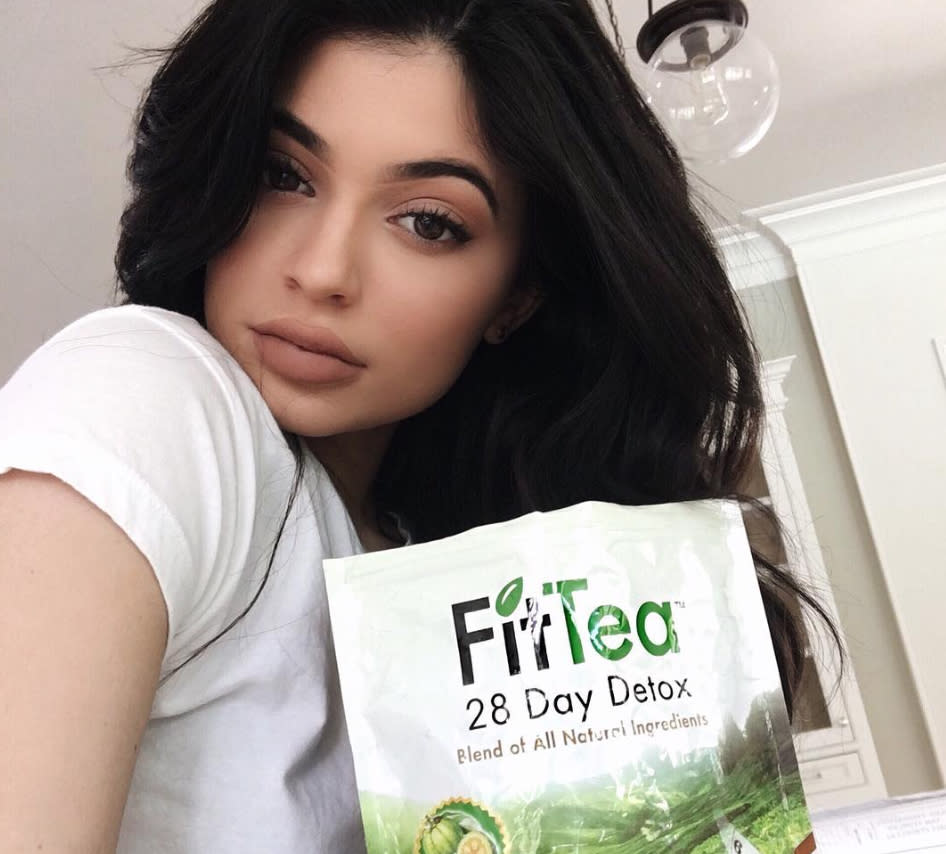What is “teatoxing” and is it dangerous?
What is “teatoxing” and is it dangerous?
Just this morning, Kylie Jenner posted an Instagram photo featuring a product called Fit Tea. She wrote, “Using @fittea before my shoots is my favorite.” While this may be the most recent instance of a celeb endorsing “teatoxing,” there are plenty more where that came from. Lindsay Lohan, Hilary Duff, Nicki Minaj, Britney Spears, Lea Michele, and many others are also members of this fancy tea club.
A photo posted by Hilary Duff (@hilaryduff) on Jan 15, 2015 at 11:44am PST
Aside from being a staple in Instagram selfies, we’re wondering: What exactly is “teatoxing?” According to brand Skinny Teatox, it’s a dietary trend that aims to provide these results: weight loss, boosted metabolism, colon cleanse, detox, suppressed appetite, and increased energy levels. Teatoxing products are essentially laxatives. Racked reports that many contain senna: An FDA-approved plant that’s often listed on the back of laxative packaging.
Here’s how the teatoxing process works: Every morning, you drink a “skinny” tea and, every evening, you complete the daily cycle with a “detoxifying tea.” As for duration of the teatox, it depends on the brand. Example: Lyfe Tea (the brand Hilary Duff uses) sells as 14-day pack for $34.95 and a 28-day pack for $55.95.
A photo posted by Nicki Minaj (@nickiminaj) on Sep 4, 2014 at 5:28pm PDT
Next question: Is teatoxing safe? “[T]here’s no published research to show teatoxes are safe or effective for weight loss or anything else,” registered dietitian Elisa Zied told Shape. “But since they are considered dietary supplements rather than foods, the companies behind them don’t need to prove any of the claims listed on the labels.” Zied is right – the Dietary Supplement Health and Education Act of 1994 states that such companies do not need the FDA’s input. They can instead do all of their own testing on these teatoxing products.
Plus – though Teen Vogue revealed that teatoxing has altered one user’s menstrual cycle and also affected another’s use of birth control – few actually report these issues to the FDA. When this happens, there’s nothing the organization can do to fix the problem. “Unless there’s a safety signal, there’s no reason for us to take action,” FDA spokesperson Lyndsay Meyer told Racked. “Which is why we tell people, ‘If you think you’ve been harmed, you need to report to us and not only to the manufacturer,’ because teatox companies don’t have to let us know what adverse events are happening. Unless people are dying, they don’t have to tell us about complaints they are receiving.”
A photo posted by Lea Michele (@msleamichele) on Jul 22, 2015 at 1:44pm PDT
Speaking of complaints, many health experts feel that teatoxing is exploiting consumers because there is no scientific evidence to back its supposed benefits. Academic physician Edzard Ernst told the Guardian that 0ur body already has organs in place to detoxify our system. There are the lungs, the liver, the kidneys, and the skin – structures that definitely do what teatoxing only claims to do.
It’s also important to note that, according to pharmacist Scott Gavura, teatoxing can “cause cramping, indigestion, dehydration, and is also just not particularly pleasant.” That’s because it’s not healthy to take a laxative for long periods of time. It can backfire and disrupt the balanced ecosystem that is your digestive system.
A photo posted by King Kylie (@kyliejenner) on Apr 28, 2016 at 8:00am PDT
Though many celebs and Instagram stars seem to be loving all things teatoxing, we must remember that they are being paid to endorse these products. They are not doctors or scientists and, as of right now, there is no medical research to back the benefits of the teatoxing trend.
The post What is “teatoxing” and is it dangerous? appeared first on HelloGiggles.

